人教版八年级上册Unit 9 Can you come to my party? Section A Grammar Focus-3c 语法课件(共43张PPT)
文档属性
| 名称 | 人教版八年级上册Unit 9 Can you come to my party? Section A Grammar Focus-3c 语法课件(共43张PPT) | 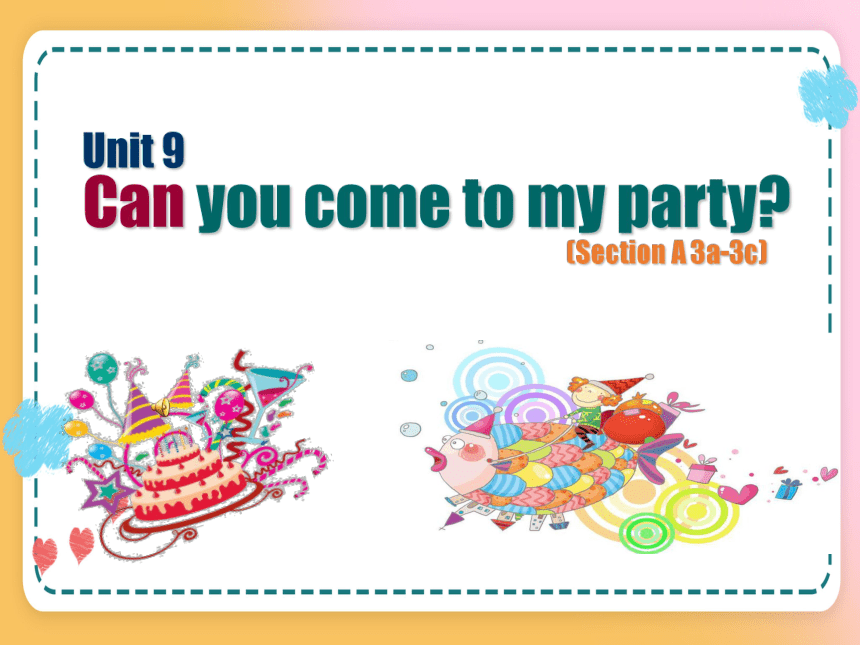 | |
| 格式 | pptx | ||
| 文件大小 | 6.3MB | ||
| 资源类型 | 教案 | ||
| 版本资源 | 人教新目标(Go for it)版 | ||
| 科目 | 英语 | ||
| 更新时间 | 2024-01-07 20:49:23 | ||
图片预览

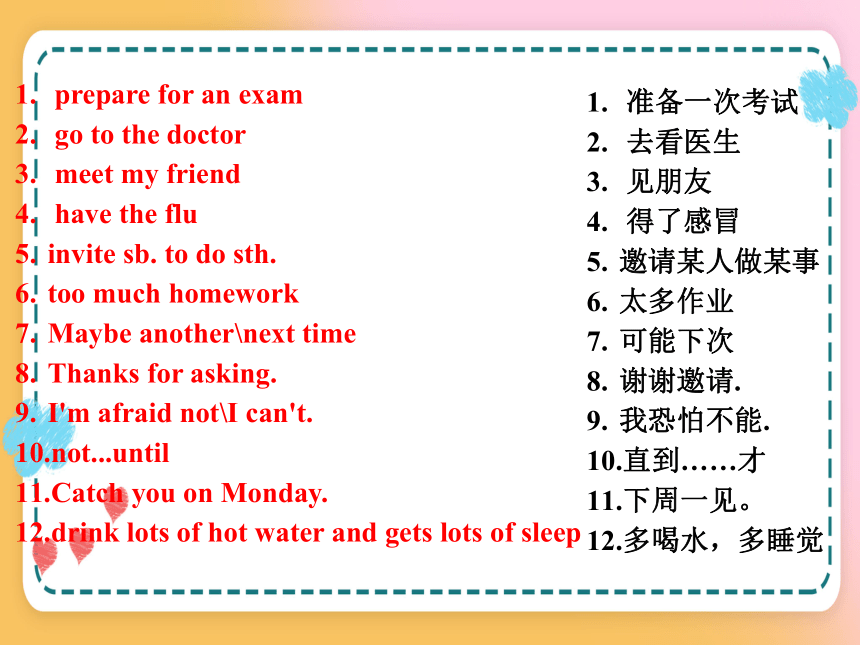

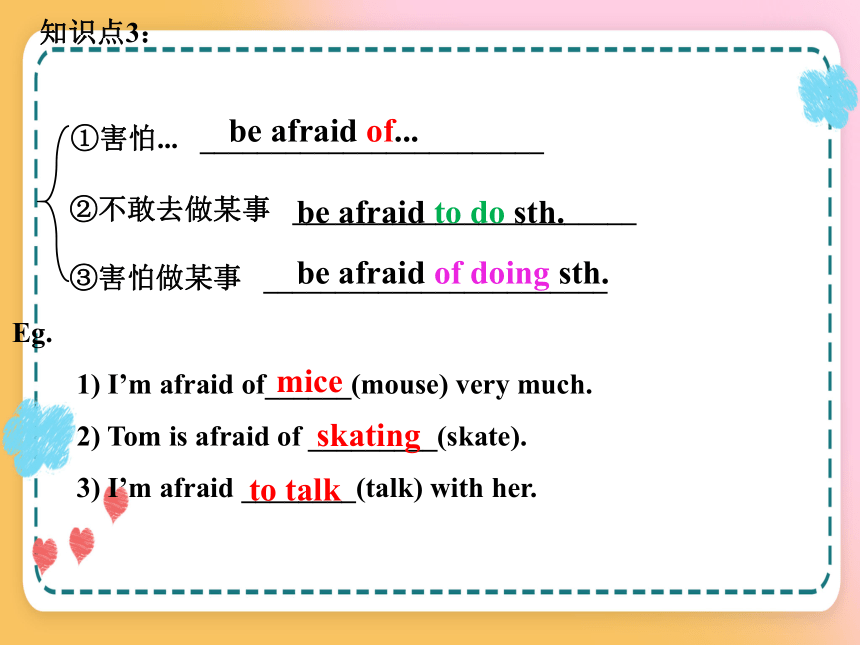
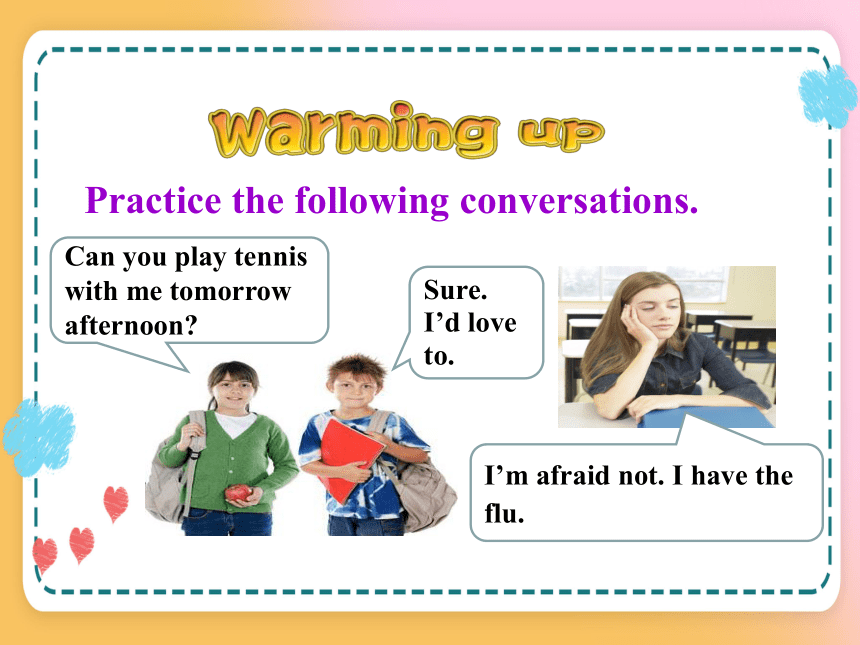
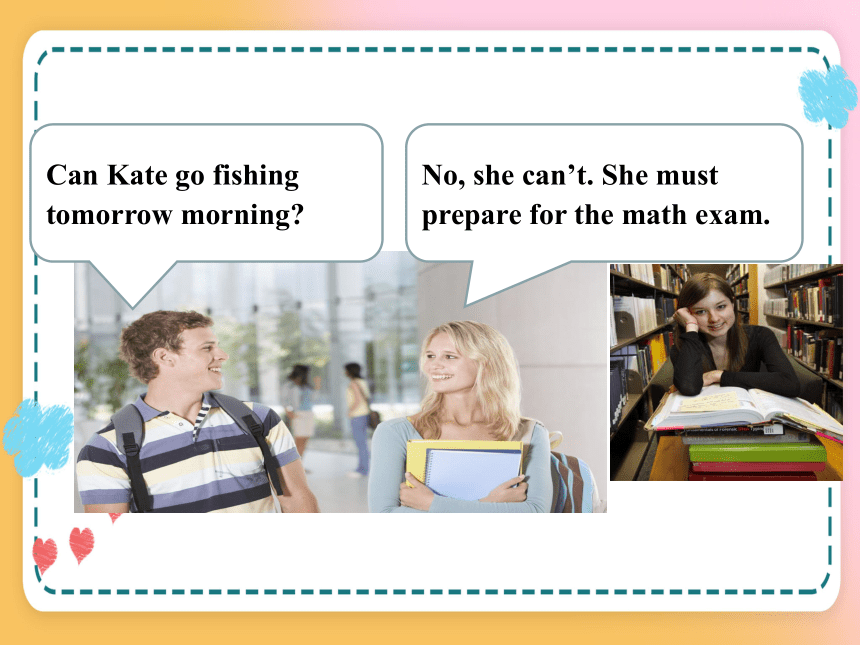

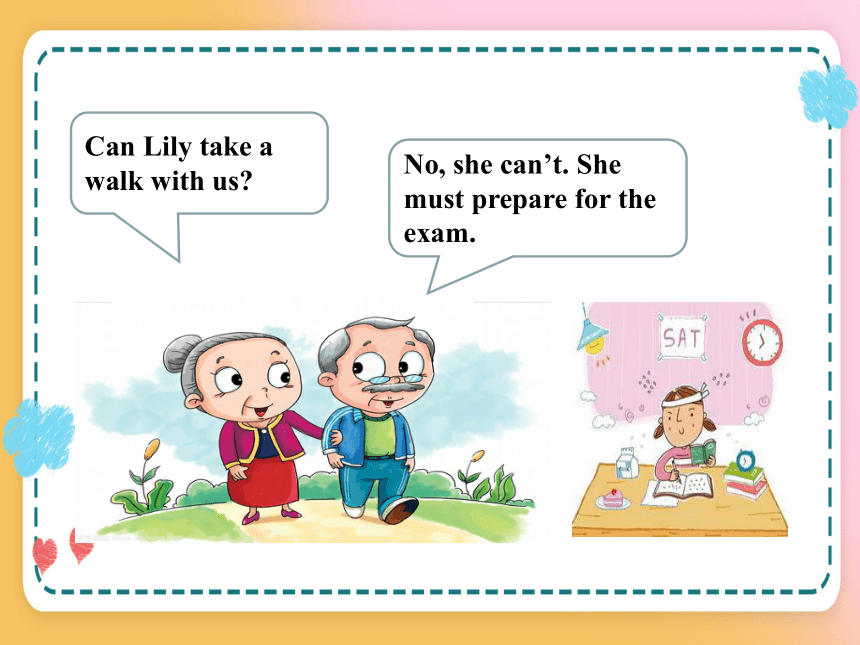
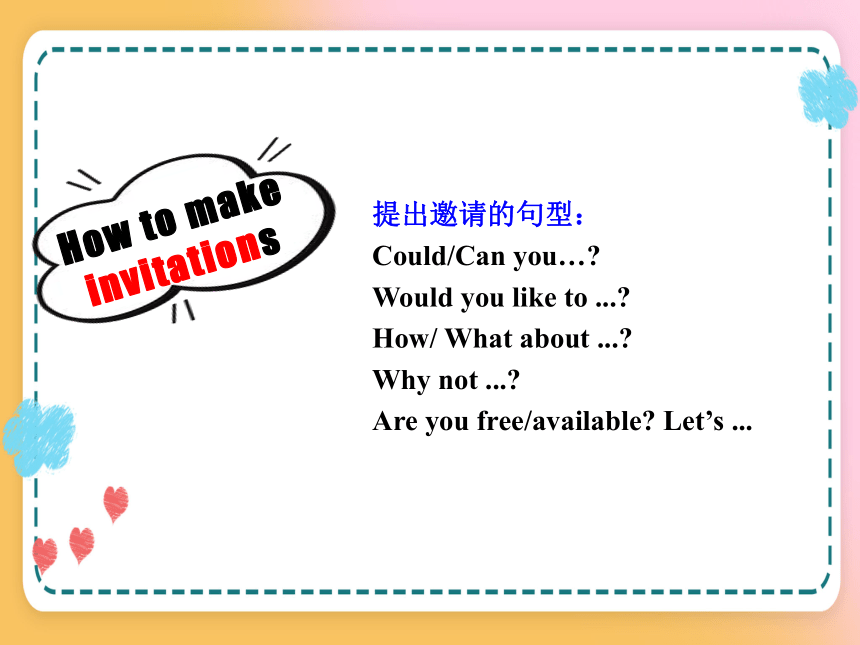
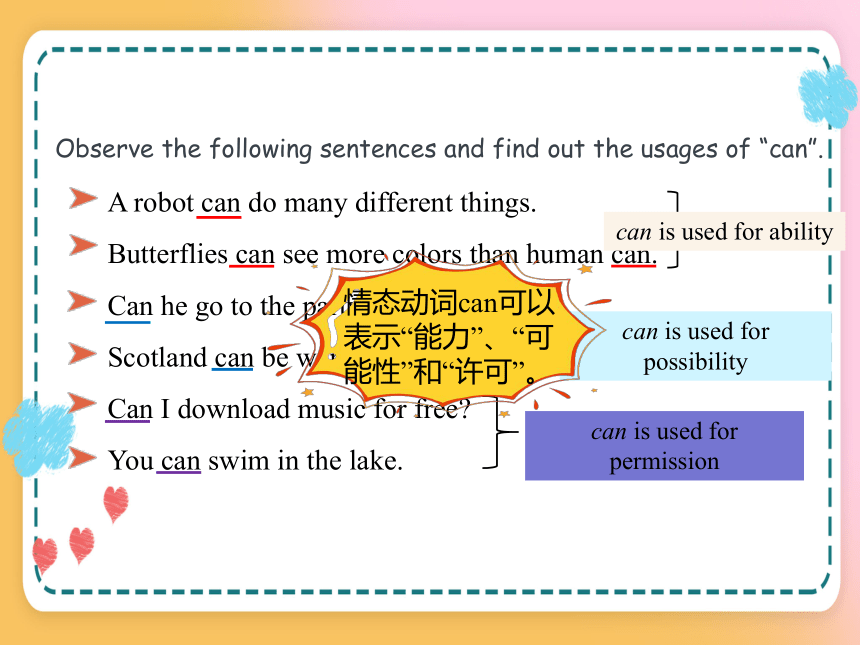
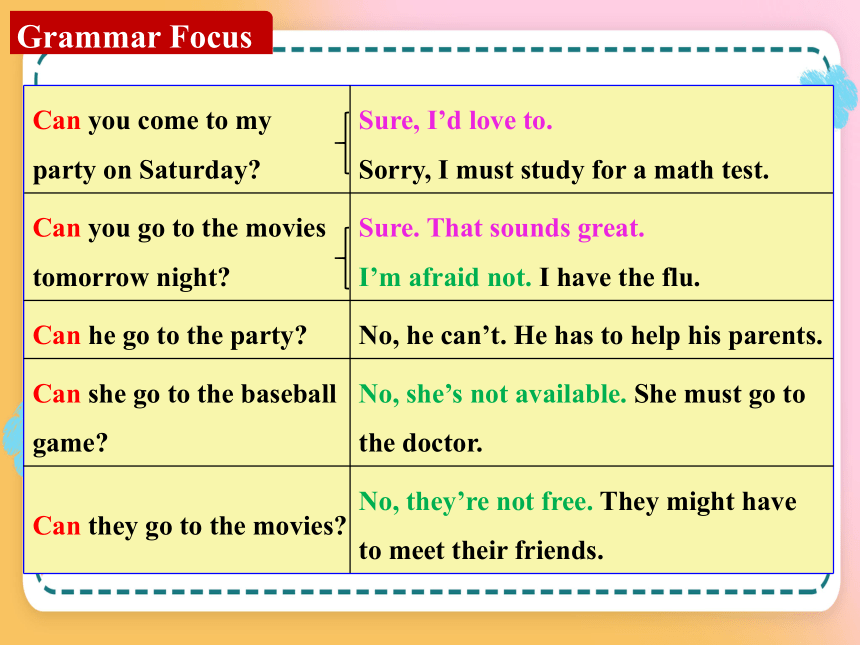
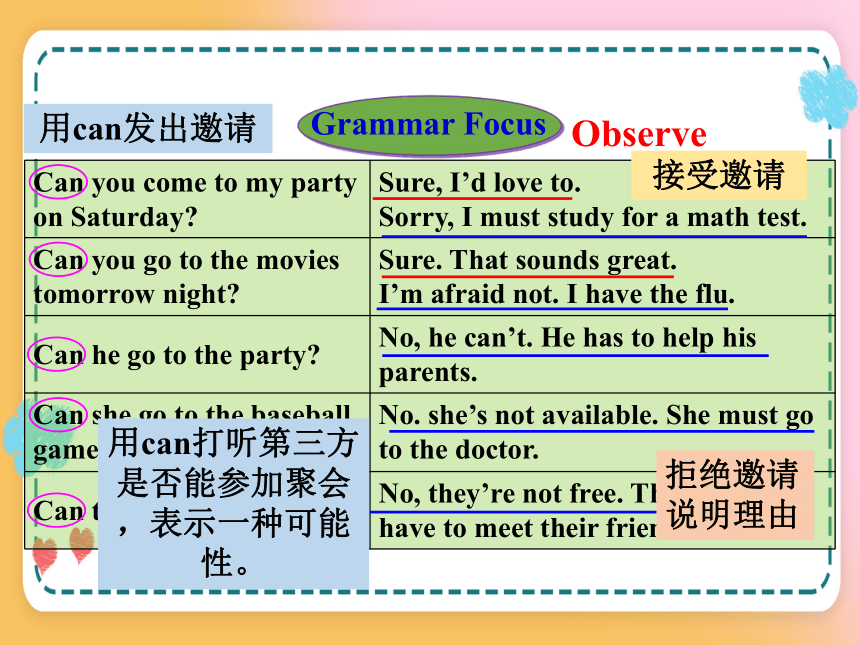
文档简介
(共43张PPT)
(Section A 3a-3c)
Can you come to my party
Unit 9
prepare for an exam
go to the doctor
meet my friend
have the flu
invite sb. to do sth.
too much homework
Maybe another\next time
Thanks for asking.
I'm afraid not\I can't.
not...until
Catch you on Monday.
drink lots of hot water and gets lots of sleep
准备一次考试
去看医生
见朋友
得了感冒
邀请某人做某事
太多作业
可能下次
谢谢邀请.
我恐怕不能.
直到……才
下周一见。
多喝水,多睡觉
Revision
知识点1:
①_________________________
有空去做某事
②_________________________
Eg: she is available_________(go) swimming.
=she is free ___________(go) swimming.
be free to do sth.
be available to do sth.
to go
to go
知识点2:
直到…才…________________________
Eg:我昨晚直到晚上12点才去睡觉。
I _______ go to bed ________12:00 yesterday.
not...until...
didn't
until
知识点3:
①害怕... ________________________
②不敢去做某事 ________________________
③害怕做某事 ________________________
Eg.
1) I’m afraid of______(mouse) very much.
2) Tom is afraid of _________(skate).
3) I’m afraid ________(talk) with her.
be afraid of...
be afraid to do sth.
be afraid of doing sth.
mice
skating
to talk
Can you play tennis with me tomorrow afternoon
Sure. I’d love to.
I’m afraid not. I have the flu.
Practice the following conversations.
Can Kate go fishing tomorrow morning
No, she can’t. She must prepare for the math exam.
Free talk
Can you play chess with me tomorrow afternoon
Sure. I’d love to.
I’m afraid not. I have the flu.
Can Lily take a walk with us
No, she can’t. She must prepare for the exam.
提出邀请的句型:
Could/Can you…
Would you like to ...
How/ What about ...
Why not ...
Are you free/available Let’s ...
How to make invitations
A robot can do many different things.
Butterflies can see more colors than human can.
Can he go to the party
Scotland can be warm in September.
Can I download music for free
You can swim in the lake.
Observe the following sentences and find out the usages of “can”.
can is used for possibility
can is used for permission
情态动词can可以表示“能力”、“可能性”和“许可”。
can is used for ability
Can you come to my party on Saturday Sure, I’d love to.
Sorry, I must study for a math test.
Can you go to the movies tomorrow night Sure. That sounds great.
I’m afraid not. I have the flu.
Can he go to the party No, he can’t. He has to help his parents.
Can she go to the baseball game No, she’s not available. She must go to the doctor.
Can they go to the movies No, they’re not free. They might have to meet their friends.
Grammar Focus
Can you come to my party on Saturday Sure, I’d love to.
Sorry, I must study for a math test.
Can you go to the movies tomorrow night Sure. That sounds great.
I’m afraid not. I have the flu.
Can he go to the party No, he can’t. He has to help his parents.
Can she go to the baseball game No. she’s not available. She must go to the doctor.
Can they go to the movies No, they’re not free. They might have to meet their friends.
Grammar Focus
Observe
用can发出邀请
用can打听第三方是否能参加聚会,表示一种可能性。
接受邀请
拒绝邀请
说明理由
Can you come to my party on Saturday Sure, I’d love to.
Sorry, I must study for a math test.
Can you go to the movies tomorrow night Sure. That sounds great.
I’m afraid not. I have the flu.
Can he go to the party No, he can’t. He has to help his parents.
Can she go to the baseball game No. she’s not available. She must go to the doctor.
Can they go to the movies No, they’re not free. They might have to meet their friends.
How do we accept or refuse an invitation
表示邀请的句型: (你能来参加我的聚会吗 )
Can you come to my party
Could you come to my party
Would you like to come to my party
接受邀请:
拒绝邀请:
I’m sorry, I can’t.(I’m not free/available)
I have to…/must…
Summary
Sure, I’d love/like to.
Sure. That sounds great.
Certainly./ Of course.
How to make an invitation
Can you come to my party
Would you like to come to my party
Have a summary
How to accept an invitation
Yes, I’d love / like to.
Certainly, I’d love / like to.
Sure, I’d love / like to.
Thanks for your invitation.
Thanks for asking me.
How to refuse an invitation
I’m sorry, I can’t. I have to…
I’d love to, but I have to/must…
Sorry, I can’t. I’m going to …
Thanks for your invitation, but…
Thank you for asking me,but…
▲
情态动词主要有:may / might, can / could, shall / should, have to, must, will / would, ought to, need, dare, used to.
(1) 有自身的含义但不完整,所以不能独立作谓语,只能和动词原形一起构成谓语,表示说话人的语气和情态。
(2) 没有人称和数的变化 。(have to 除外)
(3) 否定形式:在其之后加not 。(have to 除外)
疑问形式:情态动词提到主语之前。 (have to 除外)
1. 情态动词
问题探究
could not / couldn't
could
can not /can't /cannot
情态动词can的用法
can是一个常见的情态动词,表示说话人的语气或情态,基本意思是“能; 会”。它没有人称和数的变化,在句子中不能单独作谓语,其后必须跟实义动词原形:______________
can+动词(原形)
否定形式________________________________;过去式为_________,
其过去否定形式为__________________________
Eg:
Sam couldn’t play the piano, but now he can play it.
Grammar
Presentation
—Can you come to our party
—Sure, I’d love to. / Sorry. I’m busy.
情态动词can除了表示能力、许可或猜测,还可以表示邀请。
情态动词can表示邀请时的用法如下:
1. 当发出邀请时,要用其一般疑问句形式,其句式为:
Can+主语+动词原形+其他
Can you come to the concert 你能来听音乐会吗
情态动词can有以下常见用法:
1. 表示能力
一般指体力、知识、技能等方面的能力,即“能够;会”。
My brother can swim but I can't.
2.表示许可
多用在口语中,表示请求或允许,意为“可以;能够”等。用于疑问句中用来提出要求,用于否定句中表示不允许。
Can I use your pen / He can’t use the pen.
3.表示推测
常用于否定句或疑问句,意为“(不)可能”。用于肯定句中表示理论上的可能性,意为“有时会”。
It can be very cold here in spring.
4.表示邀请
could较can更礼貌、委婉。
Can you come to my party
Grammar
Presentation
2. 当发出邀请时,其回答分为两类。一类表示接受邀请,另一类表示拒绝邀请。
(1)常见的表示接受邀请的回答:
Yes, I’d love/like to. 是的,我很乐意。
Sure. Thanks for your invitation. 当然,谢谢邀请。
(2)常见的表示拒绝邀请的回答:
Sorry. I’m not available. 对不起,我没有空。
I’d love to, but I’m afraid I can’t. I have to revise for my test. 我很乐意去,但是恐怕不行。我不得不备考。
You don't have to tell him about it.
You mustn't tell him about it.
—Must I be home before eight o’clock
—Yes, you must. / No, you needn't. / No, you don't have to.
【have to 与must的区别】
① have to 强调一种客观情况。表示客观需要,即“不得
不” ,根据客观原因而不得不做某事。
must 意为”必须”,着重于说话人主观上认为有义务、
有必要做某事。
eg: I don’t like this bike. I must buy a new one.
我不喜欢这辆自行车,我一定要买辆新的。
This bike doesn’t work. We have to buy a new one.
这辆自行车坏了,我不得不买一辆新的。
② have to 有人称、时态、数的变化,must无人称、时
态、数的变化。
eg: His mother was ill. He had to look after her at home .
③mustn't 不表示不必,表示禁止。
1. must “必须”,后跟动词原形。 must没有人称和数的变化。
They must obey traffic rules.
We must finish the work today.
must的用法
2. must 表示主观“必须”;
have to表示客观需要,即“不得不”。
must的用法
You must stay here until I come back.
She has to go to school because
the holiday is over.
Complete the answers with might and one of the phrases in the box.
3a
watch TV
on the weekend
my cousin
visit grandparents
practice the violin
1. A: What are you going to do on Saturday
B: I’m not sure. I might ________________
2. A: What are you planning to do after school
B: I don’t know._________________
practice the violin.
I might watch TV.
3. A: When will you finish the science homework
B: __________________________________________
4. A: Who are you going to the movies with
B:__________________________________________
5. A: Are you free to come to my place on Saturday
B: __________________________________________
I might finish it on the weekend.
I might go with my cousin.
No. I might visit grandparents.
2. A: What are you planning to do after school
B: I don’t know. ________________.
3. A: When will you finish the science homework
B: _____________________________________________.
I might watch TV
I don’t know. I might finish it on the weekend
在周末
放学后
watch TV, on the weekend, my cousin,
visit my grandparents, practice the violin
be going to do和be planning to do 都用于表示将要做的事情或打算做的事情,但be planning to do有更强的目的和计划性。
4. A: Who are you going to the movies with
B: ______________________________________.
5. A: Are you free to come to my place on Saturday
B: ______________________________________________.
I’m not sure. I might go with my cousin
I’m not sure. I might have to practice the violin
练习小提琴
watch TV, on the weekend, my cousin,
visit my grandparents, practice the violin
Complete the sentences below. Use the words in brackets to help you.
3b
1. Inviting: ____________________________ (can/play tennis)
Accepting: ______________________
2. Inviting: ___________________________(would like to/go to the movies)
Refusing: _____________________
Reasons: ________________________________ (might have to)
3. Inviting: __________________________(can/hang out with us tonight)
Refusing: __________________________
Reason: __________________________________ (must)
4. Inviting: _____________________________________________
(would like to / come to my birthday party)
Accepting: ___________________________________________
Can you come to play tennis
Sure, that sounds great.
Would you like to go to the movies
I’m afraid not.
I might have to do my homework .
Can you hang out with us tonight
No, I can’t.
I must practice the violin tonight.
Would you like to come to my birthday party
Sure, I’d love to.
1. Inviting 邀请
invite v. 邀请
常用短语:
invite sb. to a party… 邀请某人到聚会
invite sb. to do sth. 邀请某人做某事
e.g. My pen friend invites me to his hometown.
我的笔友邀请我去他的家乡。
Invite a friend or family member to serve.
邀请一个朋友或家庭成员做服务工作。
【语境应用】把下面的汉语句子翻译成英语。
1) 我邀请Jenny去看电影。
____________________________________
2) 我经常收到参加晚会的邀请。
____________________________________
I invite Jenny to go to the cinema.
I often get invitations to the party.
invitation n. “邀请”,一般和to连用,“……的邀请”。
make an invitation 发出邀请
accept an invitation 接受邀请
turn down/ refuse an invitation 拒绝邀请
Language points
知识点1:
邀请(v.)______________
邀请某人去做某事________________________
邀请(n.)______________ 一封邀请函______________
Eg: 1)Thanks for your___________________(invite).
2) Lucy invited us_________(come) to her birthday party.
invite
invite sb. to do sth.
invitation
invitation
an invitation
to come
Language points
知识点2:
接受(v.)______________
接受你的邀请________________________
拒绝(n.)______________
拒绝去做某事________________________
Eg: 1)Don’t refuse________ (join) the funny club.
2)Tom __________(refuse) Sam’s invitation yesterday.
accept
accept your invitation
refuse
to join
refuse to do sth.
refused
Write down everything you have to do next week. Choose a day and time to have a party.
Morning Afternoon Evening
MON.
TUE.
WED.
THUR.
FRI.
SAT.
SUN.
Morning afternoon Evening
MON.
TUE.
WED.
THUR.
FRI.
SAT.
SUN.
Game time!
Make the chart quickly.
Try to fill the activities in the time period(6分钟)
Then, 10 of the 21 time periods will be blocked out at random(随机).
Please provide reasons for being busy during those blocked-out periods.
Write down everything you have to do next week. Choose a day and time to have a party. Then invite classmates to your party.
3c
A: Can you come to my party
B: When is it
A: Next week, on Thursday night.
B: I’m sorry. I have to study for a math test.
MON.
TUE.
WED.
THUR.
FRI.
SAT.
SUN.
Monday
Tuesday
Wednesday
Thursday
Friday
Saturday
Sunday
weekday
weekend
1. be going to _______ sth.(打算去做某事)
2. plan _____________sth.(计划去做某事)
3. finish_____________sth.(完成做某事)
4. be free ____________sth.(有时间去做某事)
语法Summary
do
to do
doing
to do
Invite
(邀请)
Accept
(接受)
Refuse
(拒绝)
1.Yes, I’d love/ like to.
2.Certainly, I’d love/ like to.
3.Sure, I’d love/ like to.
4.That sounds great/good.
5.Thanks for asking me.
6.Thanks for your invitation.….
1.I’d like/love to,but I'm going to...
2.I’m sorry I can’t. I have to…
3.I’m afraid I can’t.I must...
4.I’m afraid not.I might have to...
5.Sorry, I’m not free/available.I...
1.Can/Could you …
2.Would you like to …
3.May I invite you to…
reasons
prepare for an exam
/go to the doctor
/help my parents
/meet my friend
/have the flu...
Revision
A: Hey, Bob. 1. _____
B: I’m sorry. I have to help my parents.
A: 2.___. How about you, Ling Ling Can you come to my party
L: 3. _________
A: On Saturday afternoon.
L: Oh, no, I can’t. 4. ____________
A: That’s too bad. 5. _____________.
L: Sure! Thanks for asking.
A. That’s too bad.
B. Can you come to my party
C. Are you going shopping with me
D. Maybe another time.
E. I have to study for a test.
F. When is it
G. I’d love to.
Exercises(七选五)
B
A
F
E
D
1. Jim play soccer with his friend this weekend, because he is very busy.
A. can B. cans C. cann’t D. can’t
2. Henry his homework this afternoon.
A. have to do B. have to doing
C. has to do D. has to doing
3. — — It’s October the 14th.
A. When is today B. What’s today
C. What time is today D. What day is today
D
C
I. 选择填空。
D
Exercises
4. —______ I swim here
—I’m sorry. Children _____swim alone. It’s dangerous.
A. Must; can’t B. Can; mustn’t
C. May; must D. Can’t; can
5. —Could you tell me how to pay for the food by QR
code on the phone —_____.
A. Take it easy B. It doesn’t matter
C. With pleasure D. You’re welcome
B
C
Practice
Complete the sentences
1. 星期六你能来我的聚会吗?
____ you _____ _____ _____ ______ on Saturday
2. 当然,我乐意去。Sure. ____ ____ ___.
3. 对不起,我必须为数学考试而学习。
Sorry, I _____ ______ ____ a math test.
4. 明天晚上你能去看电影吗?
____ you ____ to the movies __________ night
5. 当然可以,听起来很棒。
_____, that _______ _____.
6. 恐怕不行,我得了流感。
I’m ______ not. I _____ ______ ____.
I’d love to
Can come to my party
must study for
Can go
tomorrow
Sure sounds great
afraid have the flu
7. 他能去聚会吗?
____ he _____ ______the party
8. 不能。他得帮助他的父母。
No, he _____. He _____ ______ ______ ______ ________.
9. 她能参加棒球比赛吗?
____ she _____ _____ _____ _________ ______
10. 不,她没有空。她必须去看医生。
No, she’s ____ _______. She ____ _____ _____ ___ _______.
11. 他们能去看电影吗?
____ they ____ _____ _____ _______
12. 不,他们没有空。他们可能必须去见朋友。
No, they’re not ____. They _____ ____ ____ ____ their friends.
Can go to the baseball game
Can go to
can’t has to help his parents
not available
Can go to the movies
free might have to meet
must go to the doctor
Thanks for listening !
(Section A 3a-3c)
Can you come to my party
Unit 9
prepare for an exam
go to the doctor
meet my friend
have the flu
invite sb. to do sth.
too much homework
Maybe another\next time
Thanks for asking.
I'm afraid not\I can't.
not...until
Catch you on Monday.
drink lots of hot water and gets lots of sleep
准备一次考试
去看医生
见朋友
得了感冒
邀请某人做某事
太多作业
可能下次
谢谢邀请.
我恐怕不能.
直到……才
下周一见。
多喝水,多睡觉
Revision
知识点1:
①_________________________
有空去做某事
②_________________________
Eg: she is available_________(go) swimming.
=she is free ___________(go) swimming.
be free to do sth.
be available to do sth.
to go
to go
知识点2:
直到…才…________________________
Eg:我昨晚直到晚上12点才去睡觉。
I _______ go to bed ________12:00 yesterday.
not...until...
didn't
until
知识点3:
①害怕... ________________________
②不敢去做某事 ________________________
③害怕做某事 ________________________
Eg.
1) I’m afraid of______(mouse) very much.
2) Tom is afraid of _________(skate).
3) I’m afraid ________(talk) with her.
be afraid of...
be afraid to do sth.
be afraid of doing sth.
mice
skating
to talk
Can you play tennis with me tomorrow afternoon
Sure. I’d love to.
I’m afraid not. I have the flu.
Practice the following conversations.
Can Kate go fishing tomorrow morning
No, she can’t. She must prepare for the math exam.
Free talk
Can you play chess with me tomorrow afternoon
Sure. I’d love to.
I’m afraid not. I have the flu.
Can Lily take a walk with us
No, she can’t. She must prepare for the exam.
提出邀请的句型:
Could/Can you…
Would you like to ...
How/ What about ...
Why not ...
Are you free/available Let’s ...
How to make invitations
A robot can do many different things.
Butterflies can see more colors than human can.
Can he go to the party
Scotland can be warm in September.
Can I download music for free
You can swim in the lake.
Observe the following sentences and find out the usages of “can”.
can is used for possibility
can is used for permission
情态动词can可以表示“能力”、“可能性”和“许可”。
can is used for ability
Can you come to my party on Saturday Sure, I’d love to.
Sorry, I must study for a math test.
Can you go to the movies tomorrow night Sure. That sounds great.
I’m afraid not. I have the flu.
Can he go to the party No, he can’t. He has to help his parents.
Can she go to the baseball game No, she’s not available. She must go to the doctor.
Can they go to the movies No, they’re not free. They might have to meet their friends.
Grammar Focus
Can you come to my party on Saturday Sure, I’d love to.
Sorry, I must study for a math test.
Can you go to the movies tomorrow night Sure. That sounds great.
I’m afraid not. I have the flu.
Can he go to the party No, he can’t. He has to help his parents.
Can she go to the baseball game No. she’s not available. She must go to the doctor.
Can they go to the movies No, they’re not free. They might have to meet their friends.
Grammar Focus
Observe
用can发出邀请
用can打听第三方是否能参加聚会,表示一种可能性。
接受邀请
拒绝邀请
说明理由
Can you come to my party on Saturday Sure, I’d love to.
Sorry, I must study for a math test.
Can you go to the movies tomorrow night Sure. That sounds great.
I’m afraid not. I have the flu.
Can he go to the party No, he can’t. He has to help his parents.
Can she go to the baseball game No. she’s not available. She must go to the doctor.
Can they go to the movies No, they’re not free. They might have to meet their friends.
How do we accept or refuse an invitation
表示邀请的句型: (你能来参加我的聚会吗 )
Can you come to my party
Could you come to my party
Would you like to come to my party
接受邀请:
拒绝邀请:
I’m sorry, I can’t.(I’m not free/available)
I have to…/must…
Summary
Sure, I’d love/like to.
Sure. That sounds great.
Certainly./ Of course.
How to make an invitation
Can you come to my party
Would you like to come to my party
Have a summary
How to accept an invitation
Yes, I’d love / like to.
Certainly, I’d love / like to.
Sure, I’d love / like to.
Thanks for your invitation.
Thanks for asking me.
How to refuse an invitation
I’m sorry, I can’t. I have to…
I’d love to, but I have to/must…
Sorry, I can’t. I’m going to …
Thanks for your invitation, but…
Thank you for asking me,but…
▲
情态动词主要有:may / might, can / could, shall / should, have to, must, will / would, ought to, need, dare, used to.
(1) 有自身的含义但不完整,所以不能独立作谓语,只能和动词原形一起构成谓语,表示说话人的语气和情态。
(2) 没有人称和数的变化 。(have to 除外)
(3) 否定形式:在其之后加not 。(have to 除外)
疑问形式:情态动词提到主语之前。 (have to 除外)
1. 情态动词
问题探究
could not / couldn't
could
can not /can't /cannot
情态动词can的用法
can是一个常见的情态动词,表示说话人的语气或情态,基本意思是“能; 会”。它没有人称和数的变化,在句子中不能单独作谓语,其后必须跟实义动词原形:______________
can+动词(原形)
否定形式________________________________;过去式为_________,
其过去否定形式为__________________________
Eg:
Sam couldn’t play the piano, but now he can play it.
Grammar
Presentation
—Can you come to our party
—Sure, I’d love to. / Sorry. I’m busy.
情态动词can除了表示能力、许可或猜测,还可以表示邀请。
情态动词can表示邀请时的用法如下:
1. 当发出邀请时,要用其一般疑问句形式,其句式为:
Can+主语+动词原形+其他
Can you come to the concert 你能来听音乐会吗
情态动词can有以下常见用法:
1. 表示能力
一般指体力、知识、技能等方面的能力,即“能够;会”。
My brother can swim but I can't.
2.表示许可
多用在口语中,表示请求或允许,意为“可以;能够”等。用于疑问句中用来提出要求,用于否定句中表示不允许。
Can I use your pen / He can’t use the pen.
3.表示推测
常用于否定句或疑问句,意为“(不)可能”。用于肯定句中表示理论上的可能性,意为“有时会”。
It can be very cold here in spring.
4.表示邀请
could较can更礼貌、委婉。
Can you come to my party
Grammar
Presentation
2. 当发出邀请时,其回答分为两类。一类表示接受邀请,另一类表示拒绝邀请。
(1)常见的表示接受邀请的回答:
Yes, I’d love/like to. 是的,我很乐意。
Sure. Thanks for your invitation. 当然,谢谢邀请。
(2)常见的表示拒绝邀请的回答:
Sorry. I’m not available. 对不起,我没有空。
I’d love to, but I’m afraid I can’t. I have to revise for my test. 我很乐意去,但是恐怕不行。我不得不备考。
You don't have to tell him about it.
You mustn't tell him about it.
—Must I be home before eight o’clock
—Yes, you must. / No, you needn't. / No, you don't have to.
【have to 与must的区别】
① have to 强调一种客观情况。表示客观需要,即“不得
不” ,根据客观原因而不得不做某事。
must 意为”必须”,着重于说话人主观上认为有义务、
有必要做某事。
eg: I don’t like this bike. I must buy a new one.
我不喜欢这辆自行车,我一定要买辆新的。
This bike doesn’t work. We have to buy a new one.
这辆自行车坏了,我不得不买一辆新的。
② have to 有人称、时态、数的变化,must无人称、时
态、数的变化。
eg: His mother was ill. He had to look after her at home .
③mustn't 不表示不必,表示禁止。
1. must “必须”,后跟动词原形。 must没有人称和数的变化。
They must obey traffic rules.
We must finish the work today.
must的用法
2. must 表示主观“必须”;
have to表示客观需要,即“不得不”。
must的用法
You must stay here until I come back.
She has to go to school because
the holiday is over.
Complete the answers with might and one of the phrases in the box.
3a
watch TV
on the weekend
my cousin
visit grandparents
practice the violin
1. A: What are you going to do on Saturday
B: I’m not sure. I might ________________
2. A: What are you planning to do after school
B: I don’t know._________________
practice the violin.
I might watch TV.
3. A: When will you finish the science homework
B: __________________________________________
4. A: Who are you going to the movies with
B:__________________________________________
5. A: Are you free to come to my place on Saturday
B: __________________________________________
I might finish it on the weekend.
I might go with my cousin.
No. I might visit grandparents.
2. A: What are you planning to do after school
B: I don’t know. ________________.
3. A: When will you finish the science homework
B: _____________________________________________.
I might watch TV
I don’t know. I might finish it on the weekend
在周末
放学后
watch TV, on the weekend, my cousin,
visit my grandparents, practice the violin
be going to do和be planning to do 都用于表示将要做的事情或打算做的事情,但be planning to do有更强的目的和计划性。
4. A: Who are you going to the movies with
B: ______________________________________.
5. A: Are you free to come to my place on Saturday
B: ______________________________________________.
I’m not sure. I might go with my cousin
I’m not sure. I might have to practice the violin
练习小提琴
watch TV, on the weekend, my cousin,
visit my grandparents, practice the violin
Complete the sentences below. Use the words in brackets to help you.
3b
1. Inviting: ____________________________ (can/play tennis)
Accepting: ______________________
2. Inviting: ___________________________(would like to/go to the movies)
Refusing: _____________________
Reasons: ________________________________ (might have to)
3. Inviting: __________________________(can/hang out with us tonight)
Refusing: __________________________
Reason: __________________________________ (must)
4. Inviting: _____________________________________________
(would like to / come to my birthday party)
Accepting: ___________________________________________
Can you come to play tennis
Sure, that sounds great.
Would you like to go to the movies
I’m afraid not.
I might have to do my homework .
Can you hang out with us tonight
No, I can’t.
I must practice the violin tonight.
Would you like to come to my birthday party
Sure, I’d love to.
1. Inviting 邀请
invite v. 邀请
常用短语:
invite sb. to a party… 邀请某人到聚会
invite sb. to do sth. 邀请某人做某事
e.g. My pen friend invites me to his hometown.
我的笔友邀请我去他的家乡。
Invite a friend or family member to serve.
邀请一个朋友或家庭成员做服务工作。
【语境应用】把下面的汉语句子翻译成英语。
1) 我邀请Jenny去看电影。
____________________________________
2) 我经常收到参加晚会的邀请。
____________________________________
I invite Jenny to go to the cinema.
I often get invitations to the party.
invitation n. “邀请”,一般和to连用,“……的邀请”。
make an invitation 发出邀请
accept an invitation 接受邀请
turn down/ refuse an invitation 拒绝邀请
Language points
知识点1:
邀请(v.)______________
邀请某人去做某事________________________
邀请(n.)______________ 一封邀请函______________
Eg: 1)Thanks for your___________________(invite).
2) Lucy invited us_________(come) to her birthday party.
invite
invite sb. to do sth.
invitation
invitation
an invitation
to come
Language points
知识点2:
接受(v.)______________
接受你的邀请________________________
拒绝(n.)______________
拒绝去做某事________________________
Eg: 1)Don’t refuse________ (join) the funny club.
2)Tom __________(refuse) Sam’s invitation yesterday.
accept
accept your invitation
refuse
to join
refuse to do sth.
refused
Write down everything you have to do next week. Choose a day and time to have a party.
Morning Afternoon Evening
MON.
TUE.
WED.
THUR.
FRI.
SAT.
SUN.
Morning afternoon Evening
MON.
TUE.
WED.
THUR.
FRI.
SAT.
SUN.
Game time!
Make the chart quickly.
Try to fill the activities in the time period(6分钟)
Then, 10 of the 21 time periods will be blocked out at random(随机).
Please provide reasons for being busy during those blocked-out periods.
Write down everything you have to do next week. Choose a day and time to have a party. Then invite classmates to your party.
3c
A: Can you come to my party
B: When is it
A: Next week, on Thursday night.
B: I’m sorry. I have to study for a math test.
MON.
TUE.
WED.
THUR.
FRI.
SAT.
SUN.
Monday
Tuesday
Wednesday
Thursday
Friday
Saturday
Sunday
weekday
weekend
1. be going to _______ sth.(打算去做某事)
2. plan _____________sth.(计划去做某事)
3. finish_____________sth.(完成做某事)
4. be free ____________sth.(有时间去做某事)
语法Summary
do
to do
doing
to do
Invite
(邀请)
Accept
(接受)
Refuse
(拒绝)
1.Yes, I’d love/ like to.
2.Certainly, I’d love/ like to.
3.Sure, I’d love/ like to.
4.That sounds great/good.
5.Thanks for asking me.
6.Thanks for your invitation.….
1.I’d like/love to,but I'm going to...
2.I’m sorry I can’t. I have to…
3.I’m afraid I can’t.I must...
4.I’m afraid not.I might have to...
5.Sorry, I’m not free/available.I...
1.Can/Could you …
2.Would you like to …
3.May I invite you to…
reasons
prepare for an exam
/go to the doctor
/help my parents
/meet my friend
/have the flu...
Revision
A: Hey, Bob. 1. _____
B: I’m sorry. I have to help my parents.
A: 2.___. How about you, Ling Ling Can you come to my party
L: 3. _________
A: On Saturday afternoon.
L: Oh, no, I can’t. 4. ____________
A: That’s too bad. 5. _____________.
L: Sure! Thanks for asking.
A. That’s too bad.
B. Can you come to my party
C. Are you going shopping with me
D. Maybe another time.
E. I have to study for a test.
F. When is it
G. I’d love to.
Exercises(七选五)
B
A
F
E
D
1. Jim play soccer with his friend this weekend, because he is very busy.
A. can B. cans C. cann’t D. can’t
2. Henry his homework this afternoon.
A. have to do B. have to doing
C. has to do D. has to doing
3. — — It’s October the 14th.
A. When is today B. What’s today
C. What time is today D. What day is today
D
C
I. 选择填空。
D
Exercises
4. —______ I swim here
—I’m sorry. Children _____swim alone. It’s dangerous.
A. Must; can’t B. Can; mustn’t
C. May; must D. Can’t; can
5. —Could you tell me how to pay for the food by QR
code on the phone —_____.
A. Take it easy B. It doesn’t matter
C. With pleasure D. You’re welcome
B
C
Practice
Complete the sentences
1. 星期六你能来我的聚会吗?
____ you _____ _____ _____ ______ on Saturday
2. 当然,我乐意去。Sure. ____ ____ ___.
3. 对不起,我必须为数学考试而学习。
Sorry, I _____ ______ ____ a math test.
4. 明天晚上你能去看电影吗?
____ you ____ to the movies __________ night
5. 当然可以,听起来很棒。
_____, that _______ _____.
6. 恐怕不行,我得了流感。
I’m ______ not. I _____ ______ ____.
I’d love to
Can come to my party
must study for
Can go
tomorrow
Sure sounds great
afraid have the flu
7. 他能去聚会吗?
____ he _____ ______the party
8. 不能。他得帮助他的父母。
No, he _____. He _____ ______ ______ ______ ________.
9. 她能参加棒球比赛吗?
____ she _____ _____ _____ _________ ______
10. 不,她没有空。她必须去看医生。
No, she’s ____ _______. She ____ _____ _____ ___ _______.
11. 他们能去看电影吗?
____ they ____ _____ _____ _______
12. 不,他们没有空。他们可能必须去见朋友。
No, they’re not ____. They _____ ____ ____ ____ their friends.
Can go to the baseball game
Can go to
can’t has to help his parents
not available
Can go to the movies
free might have to meet
must go to the doctor
Thanks for listening !
同课章节目录
- Unit 1 Where did you go on vacation?
- Section A
- Section B
- Unit 2 How often do you exercise?
- Section A
- Section B
- Unit 3 I'm more outgoing than my sister.
- Section A
- Section B
- Unit 4 What's the best movie theater?
- Section A
- Section B
- Unit 5 Do you want to watch a game show?
- Section A
- Section B
- Unit 6 I'm going to study computer science.
- Section A
- Section B
- Unit 7 Will people have robots?
- Section A
- Section B
- Unit 8 How do you make a banana milk shake?
- Section A
- Section B
- Unit 9 Can you come to my party?
- Section A
- Section B
- Unit 10 If you go to the party, you'll have a grea
- Section A
- Section B
